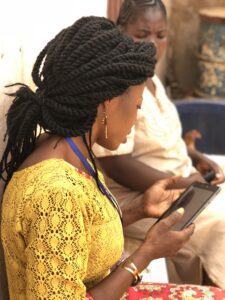By Bridget Dubus, Senior Research Analyst
While attending a recent screening of the documentary ‘In the Shadow of Biafra’ at King’s College London, a debate occurred about the impact of the Nigerian-Biafra war on current events in Nigeria1 . The documentary portrays the Nigerian-Biafran war in the late 1960s through the lens of Nigerian writers, showcasing how perceptions of the war vary depending on generation. However, some audience members were concerned that the documentary only looked at Biafrans’ struggle for independence through a historical lens, and thus, firmly confining it to the past instead of highlighting the continued fight of many Biafrans for an independent state.
Currently, the Biafra Republic Government in Exile (BRGIE) is holding a self-referendum to actualize the Biafra Republic peacefully. The first round of voting started in February 2024 and was completed on May 30th, 20242. This will be followed by two consecutive rounds of voting commencing later this month and lasting until November 20243. After the commencement of the first round of voting, the Prime Minister of BRGIE, Simon Ekpa, said that over 30 million Biafrans voted in the self-referendum, which surpasses the number of voters in the 2023 Nigerian presidential election4. Ekpa also announced that the Restoration of the Independent State of Biafra would take place following the completion of the third round of voting in the Autumn5. Biafrans’ recent attempts to establish their own independent nation could be written off by some as futile since Biafra was reabsorbed into Nigeria over 50 years ago, but their desperation to secede from Nigeria is only increasing.
Why do Biafrans want independence now?
According to Ekpa, the Biafran self-referendum is justified given the marginalization faced by many Biafrans living in the south-eastern regions of Nigeria and the ineffectiveness of the national government in solving this issue6. This sentiment is backed by ORB International’s most recent public opinion polling in Nigeria. Nigerians in the South-East and South-South regions are most likely to perceive the national government as ineffective, compared to other regions.
The South-East and South-South regions were the location of the historic homeland of the Igbo people who formed the core of the secessionist Republic of Biafra and a high concentration of Biafrans continue to live in these regions. Despite Igbos being the third largest ethnic group in Nigeria, there has yet to be an Igbo president since the end of the war in 1970, leading to a feeling of marginalization among the Igbo people7.
Beyond ethnic marginalization8, BRGIE has cited increased threats of insecurity as a justification for the self-referendum9. ORB data found that respondents in the South-East region are the most likely to feel unsafe in their communities, compared to all respondents. While insecurity issues like kidnapping, killings, and the destruction of property, have plagued the South-Eastern region of Nigeria for years, the level of violence caused by militants and terrorists continues to increase10. The national government has been unable to curb the increasing violence in the region. This increasing threat of violence, coupled with the ethnic marginalization of the Igbo people living in this region, could be a current trigger for why Biafrans want to secede from Nigeria.
Picture 1: Conducting fieldwork in Nigeria
Response of the National Government
While the Nigerian national government has not commented on the Biafran self-referendum, in January 2024 Abuja reaffirmed its opposition to any “separatist activities” while citing the One-China policy. The policy refers to China’s position that there is only one Chinese government, wherein Taiwan is a province of China rather than a separate country and government11 12. Although the government did not link its opposition to Taiwanese separatist movements with the Biafran self-referendum, several Nigerian social media users discussed the link between the two separatist movements. Based on this, it is unlikely the Nigerian government will support the results of the self-referendum and subsequent Restoration of the Independent State of Biafra. Given this data, it is unclear whether the Nigerian government’s response to the results of the self-referendum will be through political statements or escalate to a military confrontation. Therefore, it will be important to keep an eye on Biafra over the coming months.
______________________________________
1 ‘In the shadow of Biafra’ – Film screening and discussion | King’s College
2 Biafra: BRGIE claims 30m voted ‘during self-referendum’ | Daily Post
3 ‘We’re ready to go’ as over 2m Biafrans vote for self-referendum in few days – Ekpa | Daily Post
4 Biafra: Over 30 million voted for self-rule in self-referendum, says Simon Ekpa | The Guardian
5 ‘We’re ready to go’ as over 2m Biafrans vote for self-referendum in few days – Ekpa | Daily Post
6 ‘We’re ready to go’ as over 2m Biafrans vote for self-referendum in few days – Ekpa | Daily Post
7 What Would It Mean for Nigeria to Elect an Igbo President? | Foreign Policy
8 The Marginalization of the Igbo People in Nigeria’s Political and Economic Sectors: What Is the Way Forward? | Open Journal of Social Sciences
9 ‘We’re ready to go’ as over 2m Biafrans vote for self-referendum in few days – Ekpa | Daily Post
10 South-East Govs’ Endless Battle with Insecurity | PUNCH
11 What is the ‘One China’ policy? | BBC
12 Taiwan: Nigeria’s One-China Principle, Intact, Says Lawmaker | Leadership

